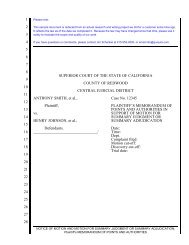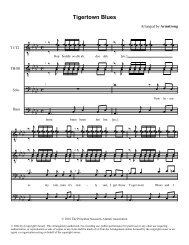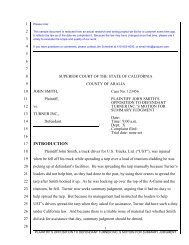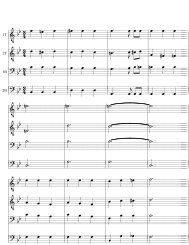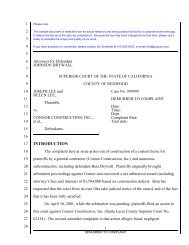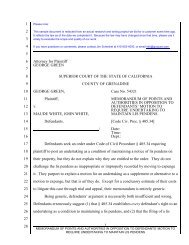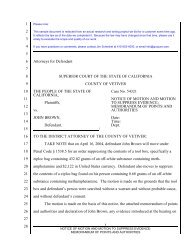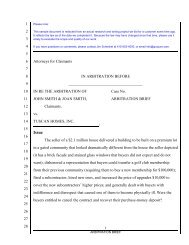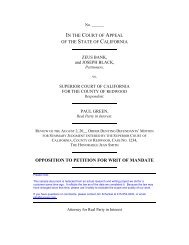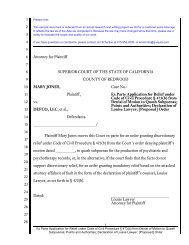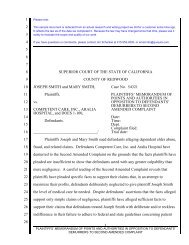FACTS AND PROCEDURAL HISTORY - Quo Jure Corporation
FACTS AND PROCEDURAL HISTORY - Quo Jure Corporation
FACTS AND PROCEDURAL HISTORY - Quo Jure Corporation
You also want an ePaper? Increase the reach of your titles
YUMPU automatically turns print PDFs into web optimized ePapers that Google loves.
ATTORNEY WORK PRODUCT – DO NOT FILE<br />
Please note:<br />
This sample document is redacted from an actual research and writing project we did for a customer some time<br />
ago. It reflects the law as of the date we completed it. Because the law may have changed since that time,<br />
please use it solely to evaluate the scope and quality of our work.<br />
If you have questions or comments, please contact Jim Schenkel at 415-553-4000, or email info@quojure.com.<br />
<strong>FACTS</strong> <strong>AND</strong> <strong>PROCEDURAL</strong> <strong>HISTORY</strong><br />
Dora White and her former law firm, Chervil & White, represented Florence<br />
Greene in protracted proceedings to increase the amount of child support Greene<br />
received from her ex-husband. When the parties disputed the attorney’s fees White<br />
claimed, White served Greene on November 2, ____, with a Notice of Client’s Rights<br />
to Arbitration.<br />
The arbitration was set to begin on February 1, ____. Greene filed several<br />
requests to continue that date based on medical problems she was suffering, and on<br />
her need to take medication she claimed impaired her ability to present her case at the<br />
hearing. Included with the requests for a continuance was a letter from Greene’s<br />
physician, which stated that his best estimate of when Greene would no longer need<br />
the medication would be four to six months. Additionally, Greene requested a<br />
continuance because she claimed that she had been unable to find counsel to<br />
represent her at the arbitration hearing.<br />
On January 25, ____, the presiding arbitrator served all parties with her written<br />
decision denying Greene’s motion for a continuance, first noting that Greene had<br />
known about the pending hearing for more than six months, which was adequate time<br />
in which to locate counsel. The arbitrator also found that, taking all relevant factors<br />
1
ATTORNEY WORK PRODUCT – DO NOT FILE<br />
into account (including the fact that Greene did not claim she was physically unable<br />
to attend the hearing), no grounds existed for a continuance. The arbitrator found<br />
that, even under medication, Greene had proved herself “able to compose and<br />
transmit cogent and appropriate letters and marshal evidence in support of her<br />
application.” January 25, ____ Order Denying Motion for Continuance, p. 3.<br />
Finally, the arbitrator observed that, under the rules of procedure, Greene could<br />
obtain the assistance of “another person” at the hearing, and that nothing in the rules<br />
required that this person be an attorney.<br />
The arbitration proceeded as scheduled. The arbitrators filed and served their<br />
Findings and Award on March 1, ____. White and Chervil & White obtained an<br />
award of $103,500.<br />
On May 5, ____, Greene petitioned to vacate the arbitration award. As<br />
grounds, she asserted that the arbitrators had unfairly refused to grant her a<br />
continuance under Code of Civil Procedure 1 § 1286.2(e). Greene did not serve the<br />
petition on White until August 12, ____.<br />
White moved to dismiss the petition to vacate, primarily on the grounds that<br />
Greene had not timely filed and served the petition within 100 days as required by<br />
§ 1288. Additionally, White asserted that Greene had failed to include the required<br />
notice of the hearing date on the petition, and that Chervil & White was not a proper<br />
party to the proceeding because the law firm had dissolved several years earlier after<br />
Mr. Chervil’s death.<br />
Greene opposed the motion on the grounds that White had misinterpreted the<br />
case law and the requirement that service under § 1288 also had to occur within the<br />
100 days. She said that California Rules of Court, Rule 1615(d) would allow her to<br />
1 All statutory references are to this code unless otherwise stated.<br />
2
ATTORNEY WORK PRODUCT – DO NOT FILE<br />
move to vacate the award up to six months after the hearing on one of the grounds set<br />
forth in § 473 (mistake, inadvertence, or excusable neglect). Greene contended that<br />
she had inadvertently failed to serve the petition in a timely manner based on her<br />
continuing medical problems. Greene also asserted that the court had the power to<br />
excuse her from the 100-day filing deadline under California Rules of Court, Rule<br />
209(c).<br />
The trial court dismissed the petition to vacate. In her tentative ruling granting<br />
White’s motion, the judge found that § 1288 specifically states that both filing and<br />
service of a petition to vacate must be made within the 100-day time limit, and that<br />
dismissal of a petition to vacate is appropriate if it was not timely filed. As to<br />
Greene’s argument that her medical condition prevented her from effecting timely<br />
service, the court observed that the 100-day requirement of § 1288 was more like the<br />
mandatory service-of-summons provision of § 583.210 than it was like California<br />
Rules of Court, Rule 3.110(b), which allows the court some discretion in granting<br />
extensions beyond its 60-day deadline. The court also noted that a party must request<br />
an extension before the time for service expires, and Greene had not done this. The<br />
court denied White’s request for fees because she had not requested them in her<br />
notice of motion, and Business and Professions Code § 6023(c) only provides for an<br />
award of fees to a prevailing party if they were incurred in obtaining confirmation,<br />
correction, or vacation of the award, but does not encompass a motion to dismiss.<br />
ISSUE<br />
Does Greene have grounds to appeal the court’s order dismissing her petition<br />
to vacate the arbitration award?<br />
3
ATTORNEY WORK PRODUCT – DO NOT FILE<br />
SUMMARY<br />
No. The language of § 1288 explicitly states that filing and service of a<br />
petition to vacate an arbitration award must be made within 100 days from service of<br />
the notice of the award. California Rules of Court, Rule 1615(d) applies only to<br />
judicial arbitrations, not private arbitrations that take place under the parties’<br />
agreement, which was the case here. Finally, California Rules of Court, Rule 209(c)<br />
does not apply here. It permits the court to extend the time in which the parties must<br />
complete discovery and go to trial under the courts’ delay-reduction program. It does<br />
not confer discretion on a judge to excuse a party from failure to comply with a<br />
mandatory filing deadline imposed by statute.<br />
DISCUSSION<br />
1. The standard of review on appeal of Greene’s motion is “abuse of<br />
discretion,” which greatly diminishes any chance of obtaining<br />
reversal of the trial court’s order on appeal.<br />
It seems likely that most cases reversed on appeal are those that are reviewed<br />
under a de novo standard, such as granting a motion for summary judgment. It is<br />
generally very difficult to obtain reversal of a trial court’s order if the appellant must<br />
prove that the court abused its discretion.<br />
4
ATTORNEY WORK PRODUCT – DO NOT FILE<br />
2. Section 1288 sets a mandatory deadline for the filing and service of a<br />
motion to vacate an arbitration award, and the trial court had no<br />
discretion to waive it.<br />
Section 1288 provides, in pertinent part: “A petition to vacate an award . . .<br />
shall be served and filed not later than 100 days after the date of the service of a<br />
signed copy of the award on the petitioner.” (Emphasis added.) Additionally,<br />
§ 1286.4(a) states that the court may not vacate an arbitration award unless “a<br />
petition . . . requesting that the award be vacated has been duly served and filed.”<br />
In Klubnikin v. California Fair Plan Assn (1978) 84 Cal.App.32d 393 (the<br />
case the trial court cited in its tentative ruling), the court of appeal confirmed an order<br />
granting a motion for summary judgment in a breach of contract action within 100<br />
days after service of the arbitration award, based on the award’s res judicata effect.<br />
The plaintiff did not file or serve a motion to vacate the arbitration award, and served<br />
the complaint more than 100 days following notice of the award. The appellate court<br />
concluded that, even if it liberally construed the complaint for breach of contract as a<br />
petition to vacate or correct the arbitration award, § 1288 mandated that the petition<br />
also be served within the 100-day period. Thus the “petition” was untimely. Id. at<br />
398.<br />
Greene filed her petition within the 100 days, but failed to serve it on White<br />
until after that deadline expired. Under the statutes and the cases interpreting it, the<br />
trial court had no discretion to deny White’s motion to dismiss the petition.<br />
3. Greene could not rely on California Rules of Court, Rule 1615<br />
because it applies only to judicial arbitrations.<br />
The Legislature enacted the Judicial Arbitration Act (Code Civ. Proc.<br />
§ 1141.10 et seq.) in 1978 as a means of coping with the increasing cost and<br />
5
ATTORNEY WORK PRODUCT – DO NOT FILE<br />
complexity of litigation in civil disputes. In the preamble to the statute, the<br />
Legislature<br />
finds and declares that arbitration has proven to be an efficient and<br />
equitable method for resolving small claims, and that courts should<br />
encourage or require the use of arbitration for such actions whenever<br />
possible.<br />
§ 1141.10(a).<br />
The act mandates submission to arbitration of certain classes of at-issue civil actions<br />
where the amount in controversy is determined to be not in excess of a specified<br />
amount (§ 1141.11), and permits submission to arbitration on the parties’ stipulation<br />
regardless of the amount in controversy (§ 1141.1). But the act provides that “[any]<br />
party may elect to have a de novo trial, by court or jury, both as to law and facts,” and<br />
that an arbitration award is final if a request for a de novo trial is not “filed within 30<br />
days after the date the arbitrator files the award with the court.” § 1141.20. If there is<br />
no request for a de novo trial and the award is not vacated (§ 1141.22), the amount of<br />
the award is entered in the judgment book. § 1141.23.<br />
Opportunity for de novo trial is what principally distinguishes court-annexed<br />
arbitration under the Judicial Arbitration Act from private arbitration conducted by<br />
the parties’ agreement and subject to the arbitration statute (§ 1280 et seq.). The<br />
Judicial Arbitration Act provides:<br />
The provisions of this chapter shall not be construed in derogation of the<br />
provisions of Title 9 (commencing with Section 1280) of Part 3, and, to<br />
that extent, the provisions of this chapter and that title are mutually<br />
exclusive and independent of each other.<br />
§ 1141.30.<br />
There are other important differences as well. Private arbitration occurs only under<br />
agreement, and it is the agreement that determines the details of the process. § 1282<br />
6
ATTORNEY WORK PRODUCT – DO NOT FILE<br />
et seq. The parties are themselves responsible for paying the arbitrator and associated<br />
costs. Except in personal injury cases there is no provision for discovery unless the<br />
agreement itself so provides. § 1283.1. While the statute provides mechanisms for<br />
judicial enforcement of the agreement (§ 1281.2) and confirmation of the award<br />
(§ 1285 et seq.), both mechanisms are extraneous to the process and, ordinarily, to the<br />
parties’ contemplation. Judicial arbitration, by contrast, is an adjunct to litigation. It<br />
is mandatory in certain cases, and it occurs only when an action has been filed. See<br />
California Rules of Court, Rule 1600. The general costs of arbitration are borne by<br />
the public, not by the parties, except that a party who requests a trial de novo and<br />
does not succeed in obtaining a judgment more favorable than the award must pay.<br />
§ 1141.21. Rules adopted by the Judicial Council provide for full discovery (Cal.<br />
Rules of Court, Rule 1612) as well as other aspects of the proceeding (Rules 1613,<br />
1614).<br />
Ordinarily cases brought under the Mandatory Fee Arbitration Act (MFAA)<br />
under Business & Professions Code § 6200 et seq. are governed by the rules of<br />
judicial arbitration. Nevertheless, the supreme court has held that a petitioner cannot<br />
rely on California Rules of Court, Rule 1615 and § 473(b) to obtain relief from the<br />
30-day deadline in which a petitioner can seek a trial de novo after receipt of notice<br />
of an MFAA arbitration award. Maynard v. Brand (2005) 36 Cal.4th 364.<br />
Greene and White were engaged in private—rather than judicial—arbitration.<br />
No independent action was filed in the superior court. The papers indicate that<br />
Greene signed an agreement to submit the case to arbitration after the dispute arose.<br />
Petition to Vacate, 8(a). As a result, Greene could not rely on Rule 1615, which<br />
applies only to judicial arbitrations, to seek relief from the 100-day deadline of<br />
§ 1288, which applies only to private arbitrations. Why White and the trial court did<br />
not state this in their papers is not clear.<br />
7
ATTORNEY WORK PRODUCT – DO NOT FILE<br />
A separate issue exists as to whether Greene could move under Code of Civil<br />
Procedure § 473(b) to obtain relief from the deadline of § 1288. But as Maynard<br />
states, § 473(b) does not afford a party relief from a mandatory, statutory deadline,<br />
such as the filing of a request for a new trial or the filing of a notice of appeal.<br />
Maynard, 8 Cal.4th at 372-373. The deadline set by § 1288 appears to be such a<br />
mandatory deadline. Thus, even if Greene filed a proper motion for relief,<br />
accompanied by a declaration as to how her failure to serve her petition was untimely<br />
because of inadvertence or excusable neglect, a court could not grant her relief from<br />
the petition’s dismissal under § 473(b).<br />
4. Greene could not rely on California Rules of Court, Rule 209(c)<br />
because it was repealed in 2004, and it applied only to the trial court<br />
delay-reduction program deadlines.<br />
Rule 209(c) was not in effect when Greene filed her petition to vacate. And in<br />
that chapter of the Rules of Court, the judge’s discretion to grant extensions of<br />
“program” deadlines refers to the court’s delay-reduction program, which mandates<br />
that a case go to trial within two years following the filing of the initial complaint.<br />
5. Even if Greene had timely filed her petition to vacate the award, it is<br />
unlikely that the court would vacate it on the grounds that Greene<br />
was unfairly denied a continuance.<br />
Trial courts afford arbitrators’ decisions great deference. A trial court can<br />
only vacate an arbitration award on one of the statutory grounds listed in § 1286.2.<br />
Even if the award contains obvious errors of law and fact appearing on its face, the<br />
court has no power to review or correct them. See Moncharsh v. Heily & Blase<br />
(1992) 3 Cal.4th 1, 9-12 (explaining history of judicial deference to arbitrators’<br />
awards).<br />
8
ATTORNEY WORK PRODUCT – DO NOT FILE<br />
Greene’s petition to vacate was based on § 1286.2(e), which allows for<br />
vacation of an arbitration award where the petitioner was unfairly denied the right to<br />
a continuance. In only one instance did a court vacate an arbitration award based on<br />
the petitioner’s failure to obtain a continuance. In Humes v. Margil Ventures (1985)<br />
174 Cal.App.3d 486, a petitioner sought confirmation of an arbitration award. The<br />
respondent then sought its vacation on the grounds that he was unfairly denied a<br />
continuance, which he had sought because, incarcerated at the time of the proceeding,<br />
he could not attend. The arbitrator never addressed the respondent’s request, and the<br />
arbitration took place in the respondent’s absence. The court of appeal vacated the<br />
award because it found that denial of the continuance deprived the respondent of his<br />
due-process rights. As part of its reasoning, the court noted that a party’s<br />
incarceration is a disability recognized by statute as tolling the statute of limitations<br />
and time for response in any court action. Id. at 496-498.<br />
The arbitrator’s decision to deny Greene’s request for a continuance indicated<br />
that Greene had not presented sufficient evidence to demonstrate good cause to<br />
continue the hearing. She did not claim that she was physically unable to attend. The<br />
arbitrator found that her ability to compose cogent letters requesting the continuance<br />
and to marshal evidence in support indicated that she could put forth the essential<br />
facts in dispute before the arbitration panel. It also specifically ordered the panel to<br />
allow Greene to invite another person, who did not have to be an attorney, to assist<br />
her in presenting her evidence. Considering the strong deference granted to an<br />
arbitrator’s findings of fact, and the dearth of cases where courts vacated arbitration<br />
awards based on failures to grant continuances, it is highly unlikely that Greene’s<br />
petition would have been successful if heard on the merits.<br />
9
ATTORNEY WORK PRODUCT – DO NOT FILE<br />
CONCLUSION<br />
It appears that Greene could not prevail on appeal. The 100-day deadline for<br />
service and filing of a motion to vacate under § 1288 is mandatory. Thus, even if<br />
Greene had filed, or were to file, a motion for relief from dismissal of her petition for<br />
failure to serve it within the 100-day deadline, § 473(b) would not relieve her from<br />
that dismissal. Finally, the California Rules of Court that Greene cited have no<br />
relevance to this case.<br />
10



